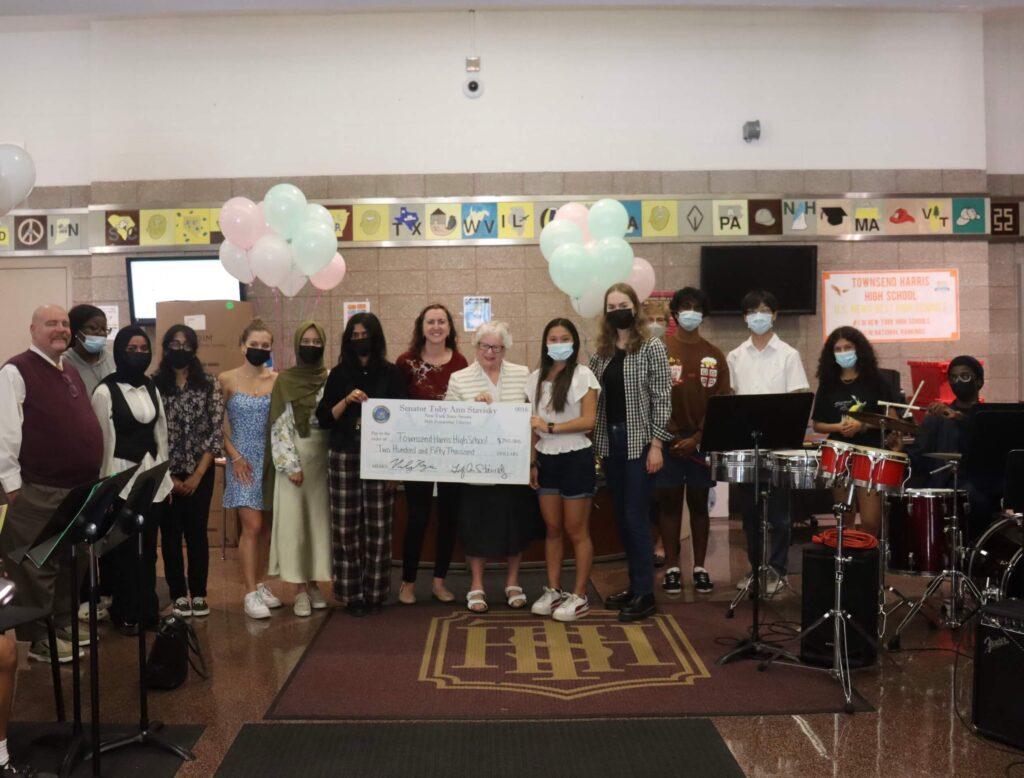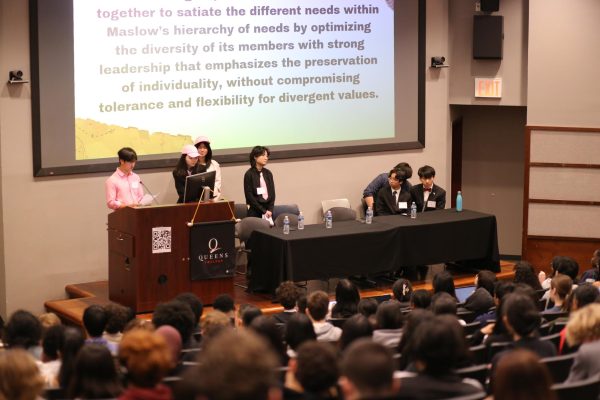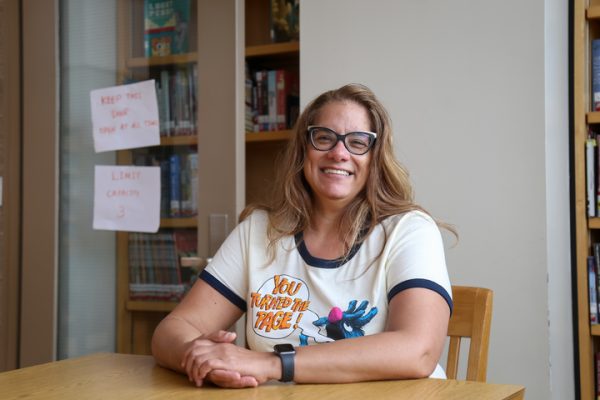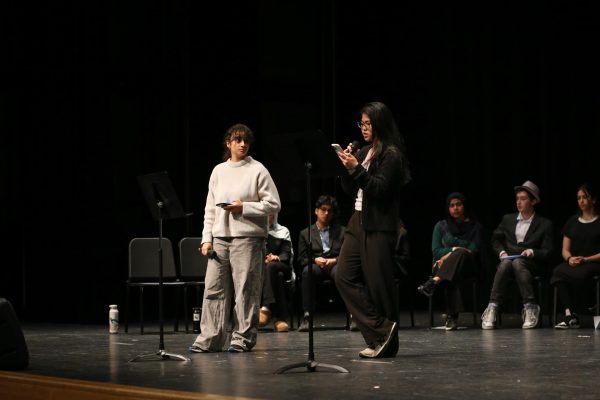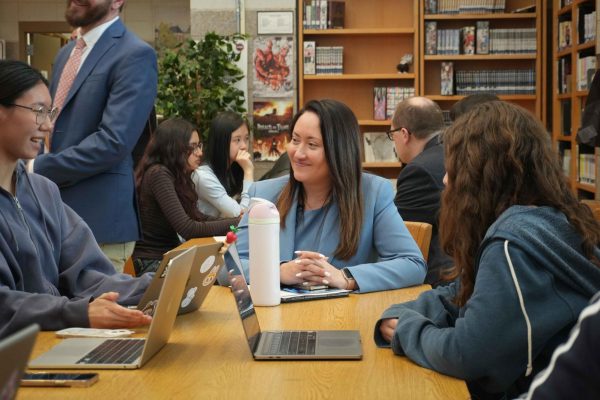Despite state funds, Queens College Bridge Program funding remains uncertain long term. A look at why THHS continues to push for greater support.

Almost every day since the start of the school year, senior Eliza Josephson has stepped out from the back door of THHS to enter the Queens College Campus. There she takes a humanities seminar course in a college setting, exploring texts such as Shelley’s Frankenstein and Shakespeare’s Othello to discover themes of perseverance, the human condition, and morality.
When Eliza isn’t sitting in on her humanities seminar class, she spends time at QC using the library’s online database and study spaces or learning Arabic in her elective classes, pursuing her passion for language and linguistics. Although Eliza officially finished her Arabic courses at QC, the credits she earned will continue to affect her as she can now enroll in an intermediary Arabic course at college.
Eliza’s courses and experiences at QC are just one of many that have been made possible by the funding of the Queens College Bridge Year Program. Under it, every THHS senior since the first graduating class in 1988 has taken one humanities seminar class and two QC elective courses. In addition, students are given full access to the campus and facilities such as the gym, recreational rooms, and pool. Yet this program almost disappeared this year and would have been discontinued if Eliza and the rest of the school community did not fight for its continuation in the past few years.
Since Principal Brian Condon broke the news that funding to the program had been cut by the Department of Education two years ago, the school community has scrambled to secure funds for the program. The Classic first spoke to Eliza in January after she was part of a school-wide effort to convince politicians to support the funding and continuation of the program at a legislative breakfast. She described the humanities seminar class in the program as essential to acclimating THHS students into college and emphasized its value in comparison to a typical high school class. “[The] Humanities Seminar has a fresh and …collegiate approach where we build essential skills in writing, discussion, and debate,” Eliza said.
The Classic can report that THHS has received additional funds for the next school year to help sustain it. Earlier this month, State Senator Toby Ann Stavisky visited the school to announce that she had secured an additional $250,000 in funds from the state legislature to support the bridge year program. Joined by assemblymember (and alumna) Nily Rozic, Senator Stavisky met with students to discuss the program and share the news of the additional funds that have been secured.
While these funds should secure the program for next year’s seniors, the fight to preserve the long-term future remains ongoing. Principal Brian Condon and Assistant Principal Ellen Fee said that cutting the QC Bridge Program would be a “last resort,” but currently, even with state funding, THHS would still need additional funds to run the program fully at the level it has in the past.
At her visit, Senator Stavisky spoke to The Classic about the need for greater budgetary support for the program: “The bridge year program needs continuing support. These one-shot allocations of money are not sustainable. We have go to make sure it’s in the budget each year as a line item so that it continues year after year and so it avoids the uncertainty and the unfair burden on the school.”
She encouraged students to continue lobbying for the funding of the program, saying that “the best lobbying is student lobbying.”
The Classic also spoke to Assemblymember Rozic, whose previous efforts at the state level had secured enough funding for the program to run for the class of 2022. She said that her experience in the program as a student “really made me a better thinker and a better person” and that now as an elected official she sees it as her responsibility to pay it forward and ensure future students have the same opportunities.
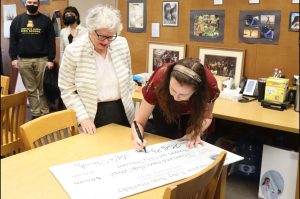
Like Senator Stavisky, she emphasized the need for greater support from the city. “Because it’s a city program,” she said, “we really have to to push at the city level to make sure that the funding is in place for years to come and that the funding is sustainable throughout the year. We’re committed as state legislators to keep fighting and make sure that funding comes through. What we’ve seen is that it’s going to take a multi-level approach.”
In a budgetary hearing in January, Assemblymember Rozic raised the issue directly with DOE Chancellor David Banks, who said that the program appeared impressive, but responded that he was unable to accurately judge the program and pledge to fund it until further learning about it. “It is my intention to get back to you, timely, to follow up and I want to talk to you directly so I understand a little bit more about what it is and perhaps, I can do a visit and walk it with you and so I can even learn more deeply about the success of the [Queens College Bridge Year] Program,” he said.
To better understand the reasoning behind why the school has mobilized to such an extent in defense of the program, The Classic spoke to Mr. Condon and recent and past alumni of THHS about what makes this issue so significant.
The Humanities Seminar Course
At the heart of the Bridge Year Program is the Humanities Seminar, which is co-taught by a THHS teacher and a QC professor. The course is essentially QC’s introductory-level literature and composition course, which should allow many students to place out of similar courses (often required) at the college they begin attending after graduating from THHS.
In the first semester of the course, students examine novels and discuss their findings through seminar discussion. Then in the second semester, students are guided by an overarching theme (through a call for papers) to construct an extended literary research paper on a novel and topic of their choosing. At the end of the year, students submit their papers to a panel of teachers and professors, and those who are selected present their research publicly at a symposium. Various alumni found this open format to be helpful for adjusting them to a college setting and embracing a wider range of viewpoints.
Professor and 1988 alumnus Joseph Merino knew he wanted to remain in the QC Bridge Program after his experience with the Humanities Seminar class. Professor Merino said the seminar was organized differently in 1988 as THHS was not located within the QC campus and there was no unifying course theme between the classes. However, despite these differences Professor Merino was still able to benefit from the guidance of a THHS instructor and QC professor co-taught the class. From his interactions with his professors, he knew that he wanted to continue to work with them, and eventually pursue a career in academia.
“I was ready to move from just helping students bridge the gap between high school and college bureaucracies, but to help them make the connections, intellectually and emotionally, between high school academics, college academia, and life-long learning”, Professor Merino said.
After working as a Teacher Assistant in the program, he is now an English professor for the Humanities Seminar.
For Eliza, her experience with the humanities course and its expansive style of learning motivated her to advocate for the program’s continuation. During each seminar, she said she was encouraged to hear the unique perspectives that each student brought in their analyses. “Each student has the opportunity to develop questions in groups and then lead discussions,” she said. “Groups tried splitting the class into halves, another into quarters. One group centered their entire discussion around a single question, and mine took a yes/no poll at the end of each idea to note where the class stood. Not all of these experiments yielded their desired results, but this unique class environment allows us full autonomy to try new approaches.”
Senior Lynda Irizarry, who also volunteered to speak at the legislative breakfast with Eliza earlier this year, spoke to The Classic about how the seminars and writing-intensives within class increased her confidence and writing skills respectively, but unlike any other English class, the freedom associated with her humanities course helped her feel her identity was heard: “The representation of different cultures and identities across the texts we have read are especially important for such a diverse student body. One of my first memories of this class was reading a poem by a Latina woman expressing her internal struggle with her divided American and native cultures. This was the most I had ever identified with a text for an English class. I am sure that I am not alone in this feeling, as we have read texts representing viewpoints from Asia, Africa, and beyond.”
Senior Nisat Nosin found the balance between freedom and the guidance of the professors to be enriching and refreshing in comparison to a conventional English class. She credited her experience in the course to her teachers. “For me, working with my professors was one of the profound aspects of the program. Being able to discuss my group’s research and receive their advice, knowledge and expertise was a great experience that I believe will prepare me for engaging with my future professors in college,” she said.
Senior Noushine Zaman, who is also enrolled in the same humanities class as Nisat, liked how the course revolved around a particular theme that focused student discussions. Her section focused on literature that relates to protest movements and journalism. “I loved our [section’s theme]. It has always been an interest of mine. I haven’t had time to pursue it, so to have our syllabus correlate to a theme made me really interested in what we were reading and learning about.”
Elective Courses
For many alumni, the elective programs offered by the Bridge Program proved to be essential in helping them explore their interests and prepare for college. Whereas the Seminar course is mandatory, for the elective, at the start of each semester, students are free to choose from the entire QC class catalog and enroll in any class as long as they meet the prerequisites. Students at THHS have enrolled in various courses from oceanography to German, whether to fulfill a potential requirement at college or to pursue an interest in exploring new disciplines.
When she visited THHS with Senator Stavisky, Assemblywoman Rozic spoke about how the program was responsible for fueling her interest in politics. She never considered a career in politics before the program, but working with college students and adults helped demystify politics and increase her confidence in pursuing it.
Class of 2019 alumna Shivani Persaud looks back at her elective classes fondly for fueling her passion in journalism and allowing her to save time and money in college. After graduating from THHS, Shivani attended the University of Central Florida, but because of the credits that she earned from the Bridge Program, she was able to graduate early with a Bachelor of Arts degree in Journalism and a minor in Intelligence and National Security. Now, she is currently enrolled in a Master of Arts program in Communication and National Security.
“Specifically for my degree, the completed credits meant I was able to apply and gain admission to a limited-access program (journalism) as a first-semester freshman, instead of as a sophomore after I would have earned the required credits. In the grand scheme of things, the Bridge Year Program is one of the main reasons I was able to graduate early,” she said.
When 2010 alumna and Creston Academy teacher Cynthia Liliana Perez Beltethon entered the QC Bridge Program, she had no idea what to expect. As a first generation college student to immigrant parents, Mx. Perez Beltethon was unfamiliar to college settings, and at first struggled to adjust through the freedom of her sociology and astronomy elective classes. However, by stepping into the world of college through the bridge program, she was able to adjust and eventually acclimate to the flexibility of college life when she entered Hunter College.
She admitted that she took her elective courses as she heard that they were easier, but after changing careers to become a teacher, the classes became invaluable as she was able to transfer credits and subsequently enroll in more classes than she would have been able to otherwise. She graduated Hunter College double majoring in psychology and gender studies, having earned 150 credits. “All these [extra] credits combined helped me get a pay bump because I had more credits than required,” she said.
Reflecting on her experience, she emphasized her appreciation for the program in how it advanced first generation students like her. “I don’t know the percentage of THHS students who are first generation, but there are so many students at least from my time who were in the same situation as me. We didn’t have exposure to higher education. Especially for our students that are most marginalized, we need these opportunities,” said Mx. Perez Belethon.
Approximately one in every seven THHS students are born in other countries as of this year according to Mr. Condon.
Currently Mx. Perez Beltethon is pursuing a doctoral degree in instructional studies. While she has not yet declared a topic for her dissertation, she said her planning has been inspired by her experience in the bridge program. “If I didn’t have that academic backbone to support me, I don’t know what would have happened. If it wasn’t for the program, I wouldn’t have been able to do the things that I have,” she said.
When THHS science teacher and alumna of class of 2015 Nicole Gleizer enrolled in classes in the QC Bridge program, she chose science electives as she knew that she was going to major in a science-related field. “My Queens College electives counted towards these electives for me which gave me the room in my program to advance in my required classes quicker,” she said.
Aside from gaining a head start on college requirement courses, many THHS students from the class of ‘22 used their elective courses as an opportunity to explore their interests.
Senior Vera Wang took introductory classes to sociology and sociology of American life. She wants to become a teacher, and therefore found a calling in sociology. In addition to matching her interests, the electives’ flexibility allowed her to better accommodate them to her schedule while fulfilling her major’s requirements. “I specifically chose asynchronous classes so that the workload would be lighter on me, and I liked that I had the option to really choose classes that worked with what I needed,” she said.
Nisat enrolled in an introductory class to microeconomics and business economics. She intends on pursuing computer science, but took classes in business to facilitate the learning of her interests. “I wanted to take business classes because I felt that although it’s fairly easy to learn coding on your own via online resources, I feel like business is a bit harder to get resources for. I decided to take business classes mainly to learn more about a subject that, although…challenging to learn, interests me,” she said.
The Value of the Credits
Numerous students and alumni told The Classic that financial and long-term benefits of the credits offered by the Bridge Program make it far too important to give up for its price tag. After taking their elective courses and humanities class, students can earn at least 12 credits, some of which can be transferred to colleges or allow students such as Eliza to bypass classes. This head start gives students the opportunity to save tuition fees for courses that they would have been required to take in college
At the legislative breakfast earlier this year, Mr. Condon argued that the overall price of the program is more than worth the money given how much it serves students long term.
After the breakfast, Mr. Condon spoke to The Classic and estimated that for THHS students who are able to graduate a semester early, they can save their family a far greater amount of money than that which was invested into them by the program, especially if they enter private colleges with far higher credit prices than a CUNY credit.
Estimating that students can potentially save a semester worth of tuition, Mr. Condon said, “You’re lessening the handicap that’s placed on college graduates by an eighth, right, at least, which is significant.”
Shivani estimates that she saved $35,000 by being able to use her QC credits to graduate three semesters early. “I’m still only 20 years old, and the acceleration of my academic career would have not been possible without the Bridge Year Program. I am already able to begin a full-time professional career with a bachelor’s under my belt, and I know that it is because of the chain reaction that the Bridge Year Program began.”
The program also had a similar impact on alumna Kristen Zhou (class of ‘21), who was able to earn 12 transferable credits from the program. In addition to offering exposure to a college-level setting, the program will allow Kristen to complete her undergraduate degree and apply for a full-time job a semester early. “Combined with AP Credit, I entered Baruch with 28 credits, placing me almost at a sophomore standing, allowing me to get ahead in my coursework, and allowing me to [plan to] finish my undergraduate degree a semester early,” Kristen said.
These savings become increasingly vital for THHS students as they enter college. Earlier this year, The Classic published an opinion article that covered student apprehensions over the rising pressure of college tuition. In addition, Mr. Condon also believes the possibility of college savings is significant given the school’s data on income from the housing forms students and families complete.
“[The Bridge Program is] more essential, just looking at some numbers based on this year’s admissions. 51 percent of our kids, that means one out of two is either free or reduced lunch, are on the lower end of the economic scale.” He also emphasized how one in every three THHS students are in need of public assistance. “They [students] need to get a good job so they can support their family… you want to go from a situation where you are not as secure economically, to one where you have opportunities and you can become secure economically,” he said.
He said that the program increases the college readiness of students each year, improving THHS’ contribution to the city’s overall students. “It’s great because it helps the statistics of the city in terms of college preparedness. It helps the borough in its numbers of students who are college ready,” said Mr. Condon. He also said that many THHS graduates either go to college in New York City or return home afterwards and contribute greatly to the wider city.
In a final message to those who may be hesitant to support the program, Eliza chose to recall the end of the speech that she delivered during the legislative breakfast event. She said: “I eagerly anticipate [my seminar class on] Mondays and Wednesdays, and I know that future Townsend Harris students will take as much away from this experience as I did.”
Mr. Condon said, “if education is supposed to be [what it strives to be]… you lift people, [you do] not tear things down.”
Your donation will support the student journalists of The Classic. Your contribution will allow us to purchase equipment, support our extracurricular events, celebrate our staff, print the paper periodically, and cover our annual website hosting costs.


























